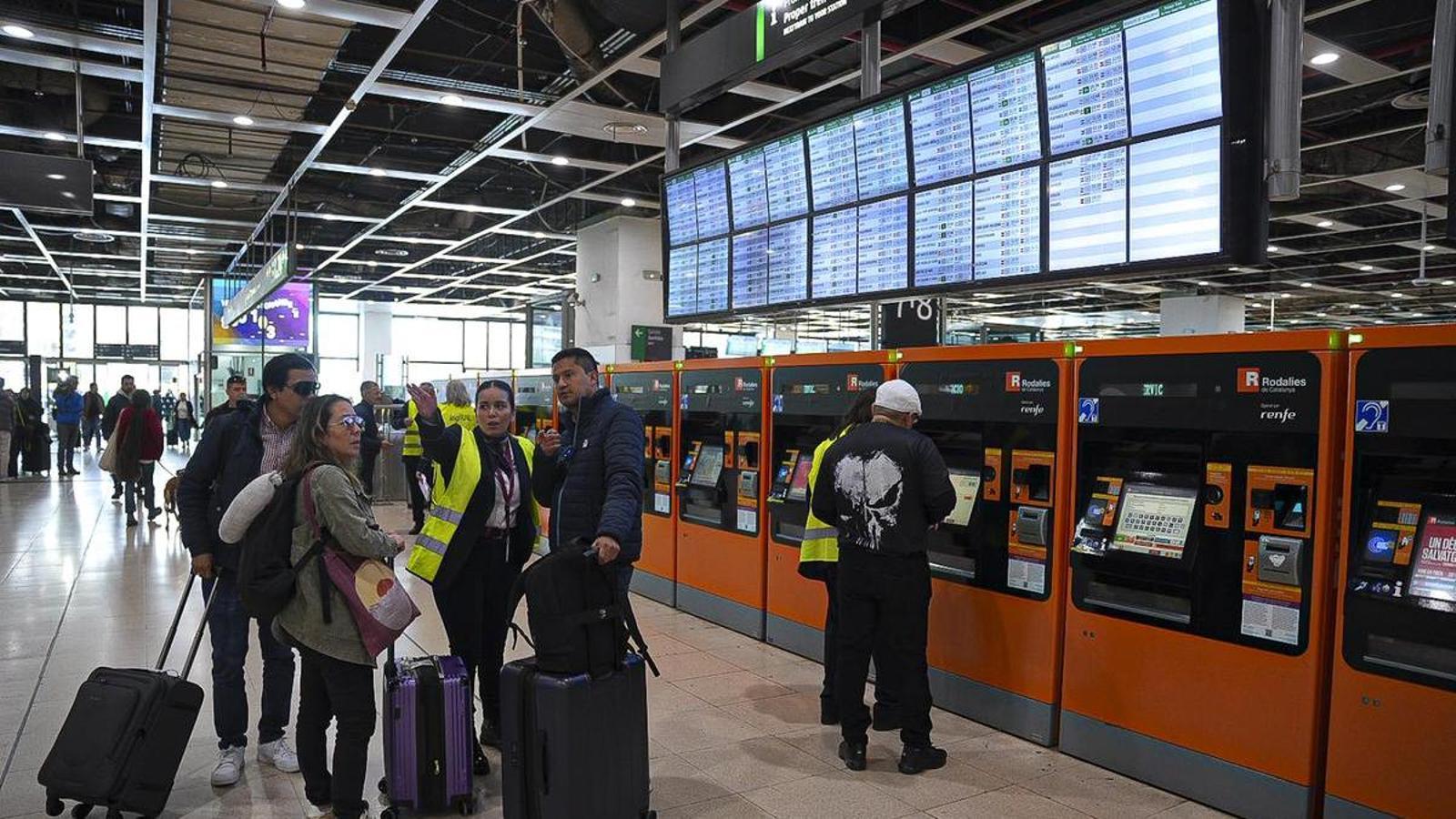Disarray on commuter trains despite the cancellation of the train drivers' strike
The cancellation of some trains has caused delays and outrage among commuters throughout the day.


BarcelonaThe calling off the strike in extremis Sunday night didn't prevent another disaster this Monday on the commuter rail network. The cancellation of some trains caused delays throughout the day and forced some passengers to wait for hours on crowded platforms. Since the service resumed early this morning, trains have been cancelled at several stations and there have also been schedule mismatches due to the fact that the agreement was reached late yesterday evening. Furthermore, although most unions have called off the strike, some minority unions, such as the CGT and the Confederación Intersindical-SF, have decided to continue the protests.
At 8:00 a.m., a new technical incident on the network, this time at the Plaza Catalunya facilities, caused even more complications with delays on lines R1, R3, and R4. However, at 9:30 a.m., Civil Protection decided to activate the pre-alert phase of the Ferrocat plan "due to various impacts," especially on lines R4 Norte and R1, "where passengers are accumulating at the stations." It was not deactivated until after 7:00 p.m.
Throughout the day, users at different points on the network, such as Sants, Bellvitge, Vallès Occidental, and also from Tarragona and northern Catalonia, have expressed their outrage on social media over the cancellation of some trains without prior notice. In some cases, users have ended up opting for alternative routes via intercity buses.
This has been the option, for example, of many people waiting for a train in Vilafranca del Penedès who, faced with delays, ended up opting for the bus. However, the alternative hasn't been easy either, because for more than a year and a half, express bus users have been complaining that the service is saturated by a daily transfer of passengers disenchanted with the Cercanías (local trains). "Renfe provides a good bus service, but between all of us, we end up collapsing it," one of the passengers lamented in a statement to ACN.
Five hours without any train
In the afternoon, tensions escalated. According to the ACN (National Commission for the National Transport of Catalonia), some passengers at Cunit station clashed with a driver following a cancelled service and broke a window in protest. This was the reaction to another chaotic day, in which some stations, such as Segur de Calafell, went for more than five hours without a train to Barcelona. According to the Dignity on the Tracks platform and confirmed by Renfe, from midday until just after five in the afternoon, no northbound trains stopped on the platform. According to the southbound trains' association, only two trains stopped during this time slot.
The lack of trains has caused overcrowding at the stations and trains to be packed to capacity. Some passengers have reported having to wait more than two hours on the platform, and that in many cases the trains heading to Barcelona were so full that boarding was impossible beyond some stations.
Due to the various incidents across the network, by midday Renfe had already deployed an exceptional alternative system to cover some routes this Monday and mitigate the effects on users. Thus, they have set up an alternative road plan between Cerdanyola del Vallès and Cerdanyola Universitat to cover the section normally served by line R7. The same has occurred between Mollet Sant Fost and Castellbisbal/Martorell central line of line R8.
Agreement for the new subsidiary to remain within Renfe
Yesterday's last-minute agreement helped avoid even greater chaos on the rail network this Monday, but the parties were already warning that the service could still suffer problems. The document agreed upon by the majority unions of Renfe and Adif and the Spanish and Catalan governments establishes that it will allow "the planned rail services to be provided almost completely normally," but it also issues a warning: on the one hand, that not all unions have decided to cancel the strike; and, on the other, that given the time of the agreement, there was not enough time to assign the services to all drivers.
According to Andrés Rubio, union spokesperson for the Renfe works council, "the problem with the rail network in Catalonia lies in the lack of investment." He expressed this in statements to Catalunya Ràdio, where he also stated that it is a point they have defended "despite all the protests" made by the train drivers' group. Rubio believes that the Generalitat's commitment to signing a new program contract—something that has eluded them for eight years, he emphasized—will unblock much-needed investments and materials.
Furthermore, pressure from workers has ensured that, when the transfer of the first line (R1) is formalized, the new management company—Cercanías Catalunya SA—will continue, for the time being, under the umbrella of the Renfe Group as a subsidiary for an unspecified period. This company will be jointly managed by the Catalan government and the operator, Renfe. Furthermore, the state-owned company will hold a majority stake in the new company, while the Catalan government will control the board of directors and, in practice, its management: it will hold the presidency and the casting vote, as announced yesterday by the Secretary of State for Transport, José Antonio Santano.
The document also specifies that the new subsidiary "will be part of the Renfe Group with respect and guarantee of labor rights, including the application of the Group's collective bargaining agreement," as well as other current labor agreements. Thus, workers will not be affected by aspects they considered key, such as seniority or mobility between destinations. Point 4 of the text makes it clear that Adif and Renfe workers have the right "to voluntarily decide to remain" in these two state-owned public companies.
"It's important that it remain within Renfe because what we understood was the intention was to create another company, which generates multiple costs," argues Rubio, a member of the Renfe works council. "Furthermore, even if working conditions are maintained initially, when a company is split off, the conditions are maintained only for a limited time, and then collective bargaining agreements have to be renegotiated, and that's what we don't want; of course not," added the union spokesperson, who described the agreement as "sensible" and "balanced" for all parties.
The regional minister for Territory, Silvia Paneque, confirmed that the Catalan government is "satisfied" with the agreement that allowed the strike to be called off and noted that preserving labor rights was a commitment of the Catalan government. However, Paneque emphasized several points. "The transfer is a political agreement that we maintain and that we want to make to improve the service. We want better governance [of the rail network] with a Catalan company that makes decisions locally and responds to an endemic problem," the minister said.
"What is certain is that I have insisted that there are some errors that must begin to decrease from now on," Paneque said. The minister was referring to the problems on Monday, which forced the cancellation of several trains, as well as the incidents that have accumulated in Plaça Catalunya. "These errors must be addressed immediately, and this morning we must work to preserve services as quickly as possible," he reiterated.

